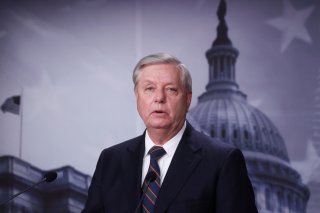Court Postpones Lindsey Graham’s Testimony in Georgia Election Probe
Graham is being asked to testify to phone calls he had with Georgia’s Secretary of State Brad Raffensperger shortly after the 2020 election.
A federal appeals court on Sunday agreed to temporarily pause a lower court’s order requiring that Sen. Lindsey Graham (R-SC) testify before a special grand jury that’s probing possible illegal efforts to overturn former President Donald Trump’s 2020 presidential election loss in Georgia, CBS News reported.
A subpoena had instructed the Republican senator to appear before the grand jury on Tuesday.
Last Monday, U.S. District Judge Leigh Martin May denied Graham’s request to quash the subpoena due to his status as a high-ranking government official.
“If the court were to accept Senator Graham’s sovereign immunity argument, it would mean that U.S. senators would not be required to testify before state grand juries no matter the circumstances,” May wrote.
“The law would give them complete immunity based solely on their status as federal officials,” she continued.
The three-judge panel of the appeals court sent the case back to May to decide whether the subpoena should be partially quashed or modified due to protections granted to members of Congress by the U.S. Constitution.
Fulton County District Attorney Fani Willis opened the investigation early last year after a January 2, 2021, phone call surfaced between Trump and Georgia Secretary of State Brad Raffensperger. During that conversation, Trump suggested that Raffensperger could “find” the votes needed to overturn his narrow loss in the state.
Willis and her team have stated that they want to ask Graham about two specific phone calls they say he made to Raffensperger and his staff shortly after the election.
During those calls, Graham asked about “reexamining certain absentee ballots cast in Georgia in order to explore the possibility of a more favorable outcome for former President Donald Trump,” according to Willis. Graham also “made reference to allegations of widespread voter fraud in the November 2020 election in Georgia, consistent with public statements made by known affiliates of the Trump Campaign,” she added.
Graham’s lawyers had argued for weeks that his post-election calls to Raffensperger had a legislative purpose and therefore are covered by the speech and debate clause of the Constitution.
“The Constitution’s Speech or Debate Clause prevents a local official from questioning a Senator about how that Senator did his job. Here, Senator Graham was doing his due diligence before the Electoral Count Act certification vote—where he voted to certify the election,” a statement from Graham's office read.
“Although the district court acknowledged that Speech or Debate may protect some of Senator Graham’s activities, she nevertheless ignored the constitutional text and binding Supreme Court precedent,” it added.
Ethen Kim Lieser is a Washington state-based Finance and Tech Editor who has held posts at Google, The Korea Herald, Lincoln Journal Star, AsianWeek, and Arirang TV. Follow or contact him on LinkedIn.
Image: Reuters.

